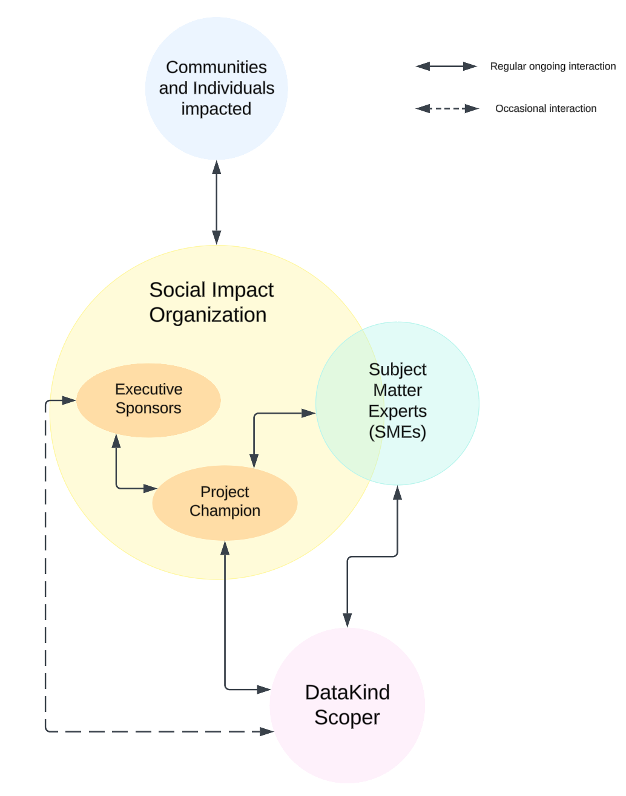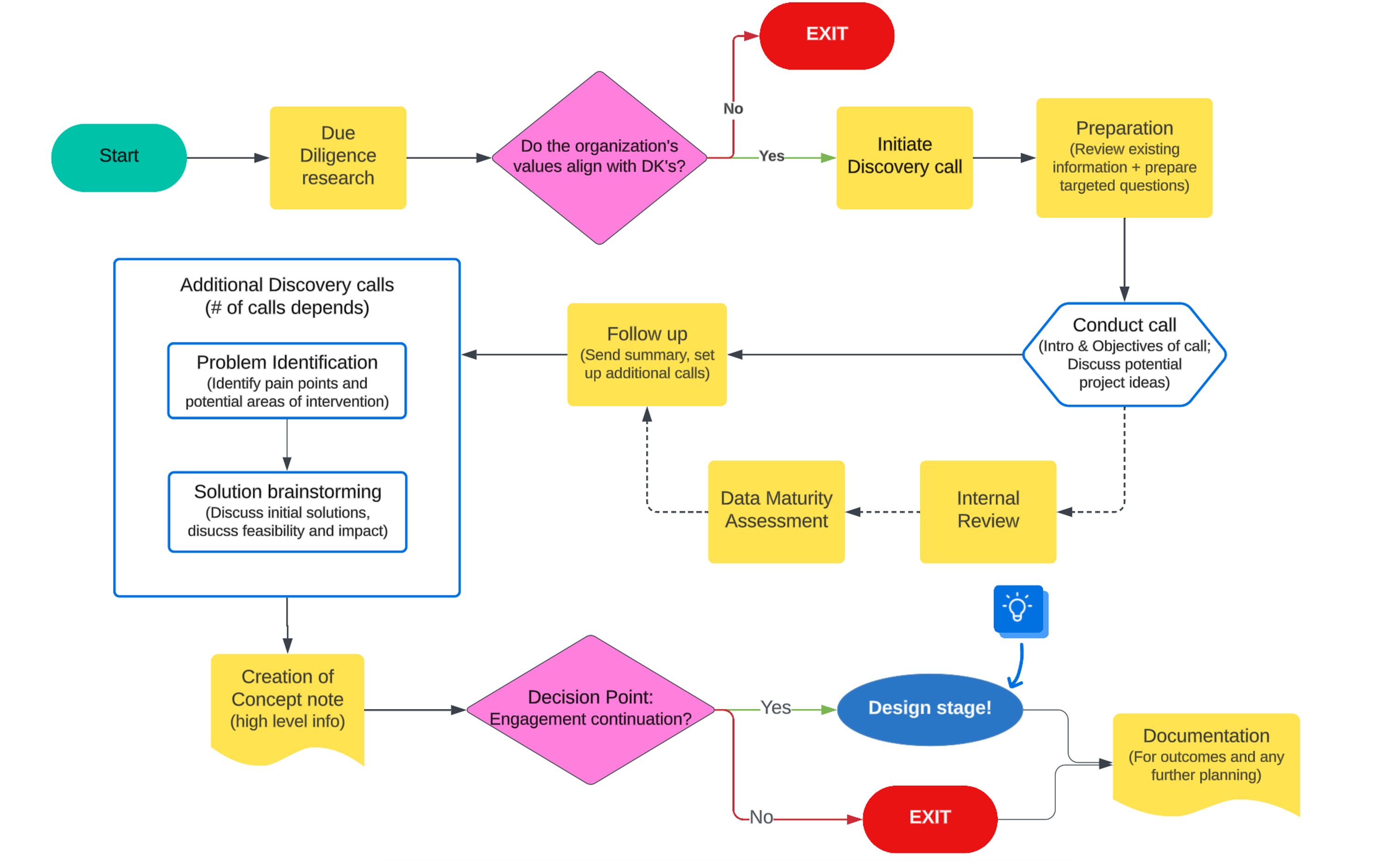Intended audience: DataKind Volunteers
Overview
The first project stage is Discovery. It starts as soon as a potential project opportunity is identified, and continues as DataKinders work with the partner to discover if the lead would be a good fit for a DataKind project. The goal of this stage is for both parties (DataKind and potential partner) to decide if there is a mutual good fit to collaborate on a project. A huge part of this decision-making process is mapping the organization’s processes and theory of change to understand areas of potential data science intervention. This stage includes ensuring mission and value alignment, enlisting a Project Champion (project partner representative), and brainstorming project ideas. The team has finished the Discovery Stage and moves into the Design Stage when the organization has been vetted, project opportunities have been identified, and the teams have mutually decided to move forward with data sharing through a shared concept note. Together, completing the Discovery and Design stages is also known as “scoping” a project.
Roles and responsibilities
The Discovery stage is led by the Scoper(s), which is typically a role for an experienced Chapter volunteer, DataKind staff member, or someone intending to also volunteer as the Data Ambassador. Chapter Leaders or DataKind staff oversee the process by checking in and providing support and assistance to the Scoper.
If the project will have a Data Ambassador, they are at times brought on in the Discovery Stage after a project partner organization is vetted and a potential project opportunity has been identified. The Data Ambassador can then join the technical conversations and conduct the data audit, and assist in the transition into the Design stage. Having the Data Ambassador engage in the design process helps set them and the project up for success, as they will be leading the Execute Stage.

Discovery stage steps
- Determine if the team has capacity to take on another project
- Research the organization, ensuring it is the right fit for DataKind
- Check for DataKind value alignment in the organization’s mission and values
- Ensure the partner organization has leadership buy-in to work with DataKind volunteers through an Executive Sponsor
- Ensure the partner organization has a data-savvy, communicative, and strategic Project Champion for DataKind to work with
- Create a standard Google Drive folder
- Have 1-3 discovery calls with the partner organization to ideate and discuss areas data science might help
- Evaluate the partner’s readiness to use and maintain a data science solution with a data maturity assessment
- Create draft project statement(s) based on the data science project(s) identified and the partner’s theory of change
- Note: Propose a few early back-up plans for more risky ideas discussed in early calls with partner organizations. Alternatives with back-up plans make it easier to discuss later on when the original plan doesn’t work out.
- Consider ethical implications of the project
- Assess that there is no obvious alternative or existing transferable solution with light online research on the landscape of potential projects
- Ensure the partner has data available now (or knows of public data that will meet their requirements)
- Document everything discovered in a Concept Note
- MUST DO: Scoper(s) check in with advisory team to review what was discovered, align on the Concept Note, and decide whether and how to move forward

Ethical considerations
Before moving the project from the Discover Stage to the Design Stage, be sure to pause and make sure that you did not miss any elements that may merit ethical considerations. You’ll often find that discerning all the ethical implications of a project during the Discover Stage is not entirely straightforward. For example, how should you proceed with a project that aims to serve humanity, but that also raises policy disagreements, political controversies, and/or clashing personal beliefs? Discovering ethically requires ensuring, at a minimum, the following steps have been taken:
- The organization, partner organization, and funders have been researched and properly vetted to ensure value alignment and alignment with DataKind’s mission.
- The team has gained a strong understanding of the individuals that the organization serves and how.
- The team has clearly identified who will be impacted by the data science solution and considered the economic, social, political, and/or environmental dimensions of the impact on those communities, along with any potential biases or disparate impact the solution could create or exacerbate.
A few other things to be mindful of when considering ethics in the Discovery Stage of a project include:
- Be wary of organizations that want you to “prove their impact”. It helps to remind people that we are there to ask questions, but we do not shy away from honest results that show the organization could do better.
- Put your radar up for organizations that don’t seem to be considering their stakeholders. A group that wants to create credit risk models for poor farmers without working closely with poor farmers runs the risk of creating deleterious or, at best, ineffective interventions.
- Consider statistical bias concerns, even in this early stage of the process. Many organizations are not familiar with these issues, so listen for issues of sampling bias, poor experimental design, or confirmation bias in what they are asking for.
Discovery may lead to a decision to not move forward
Every single step as we discover and design a project is a potential exit point for DataKind or the partner organization. If the partner organization is not aligned or any step of the process is not successful, DataKind will end the engagement or place it on hold. We always document why the engagement was ended or placed on hold, and volunteers are expected to report back to your DataKind staff support with all the relevant documentation when they have identified a need to pause or exit a project.
Contributer(s): Rachel Wells
Contact us
If you would like to learn more about us, partner with us, or get in touch, visit our website or email community@datakind.org.
Subscribe
